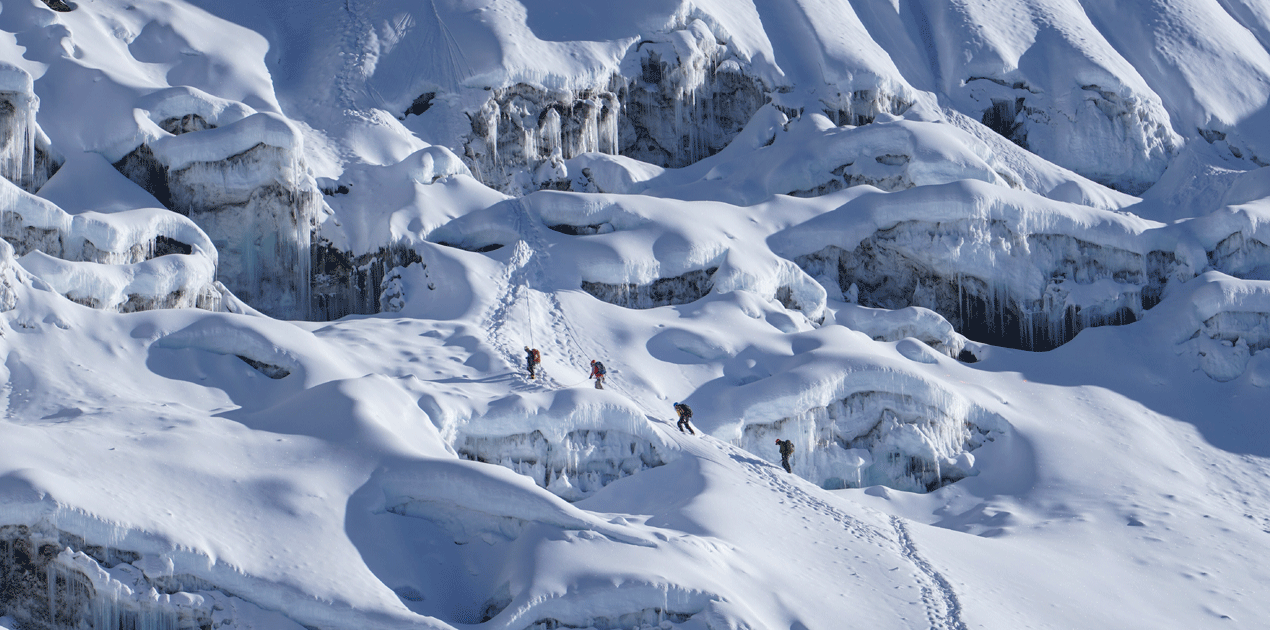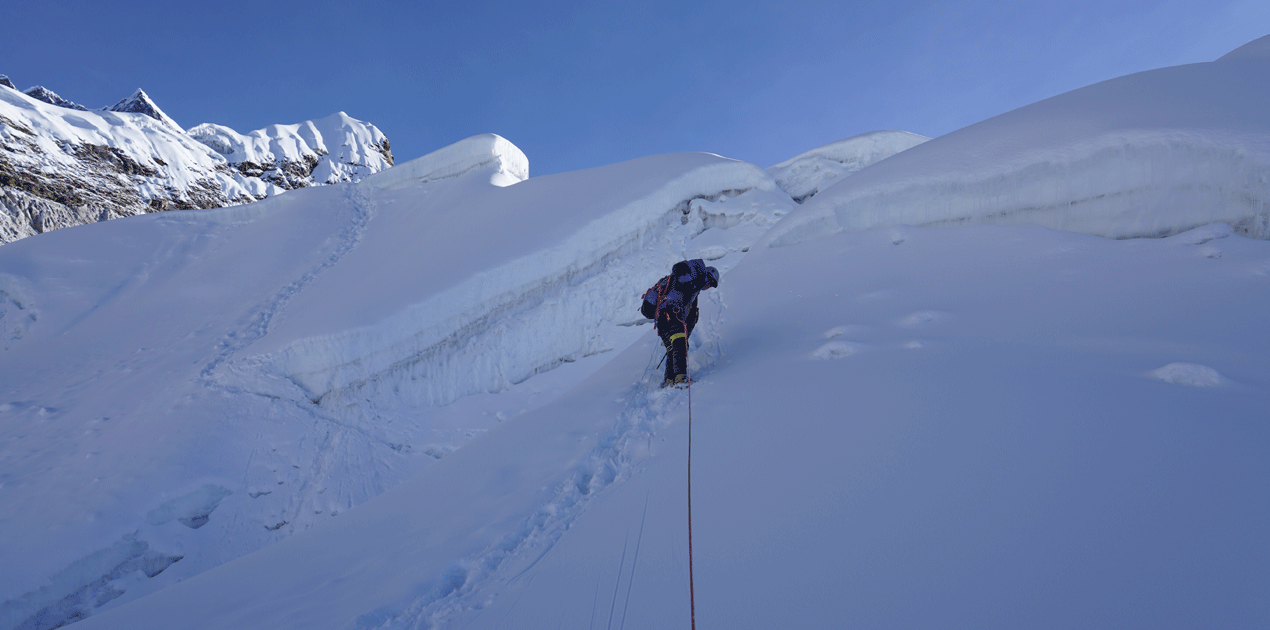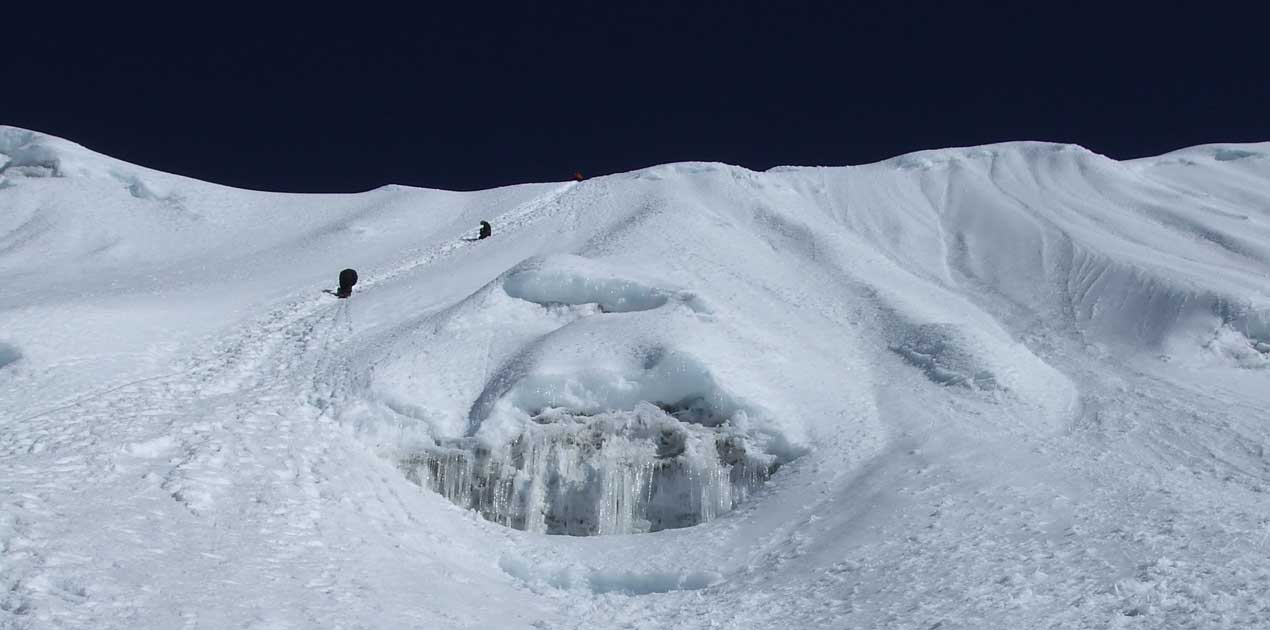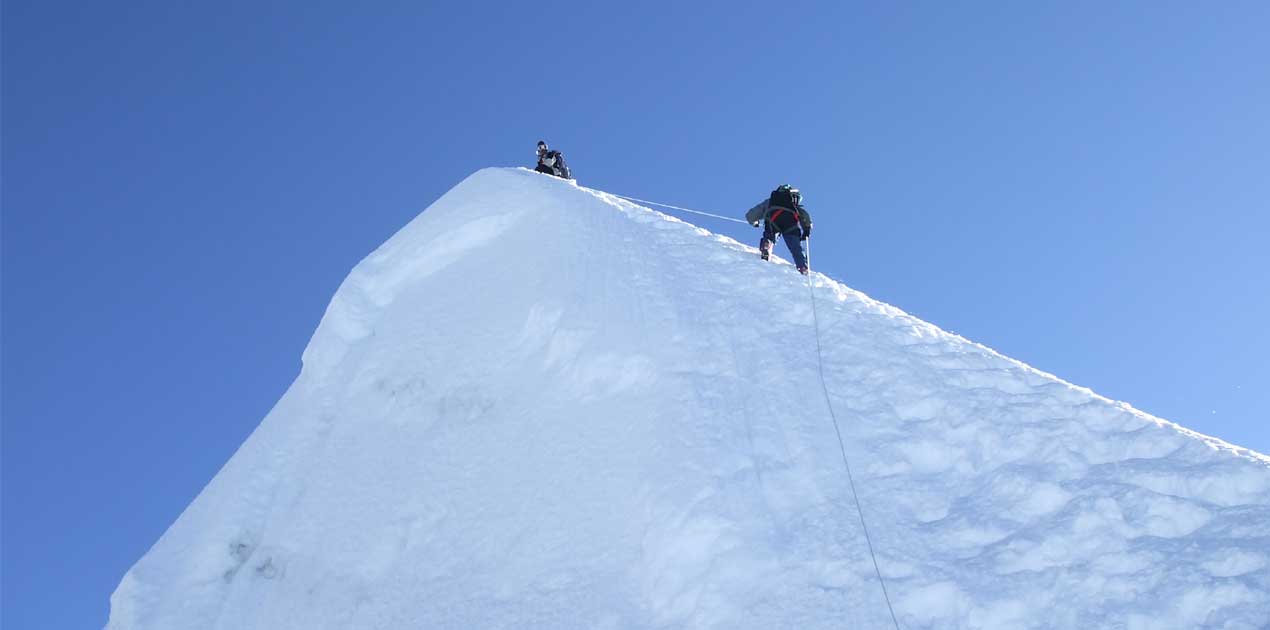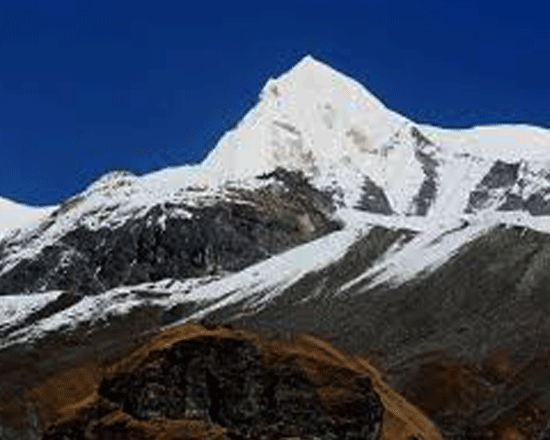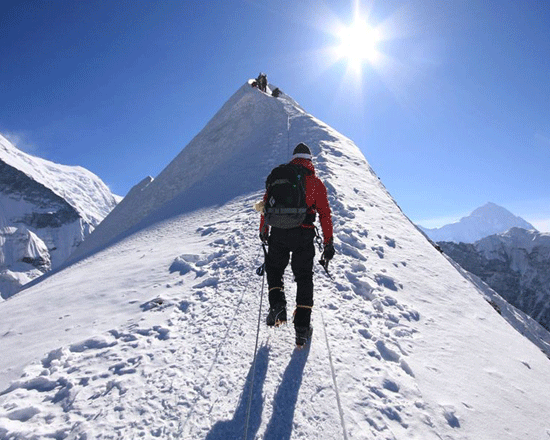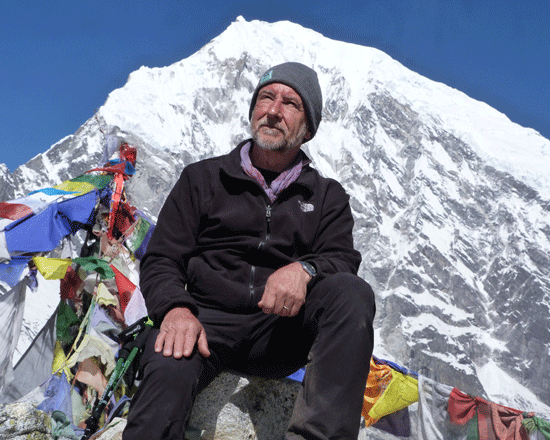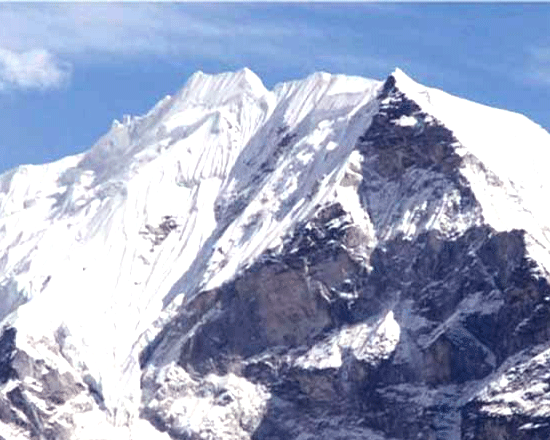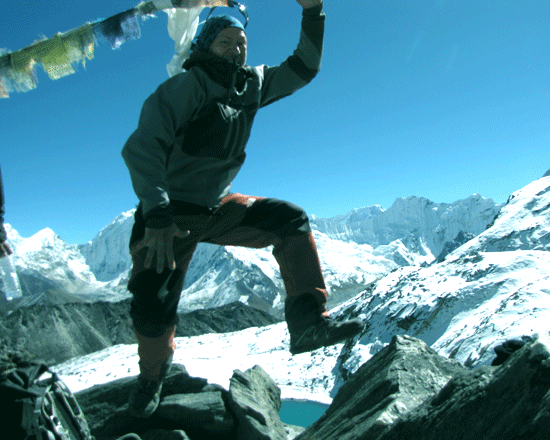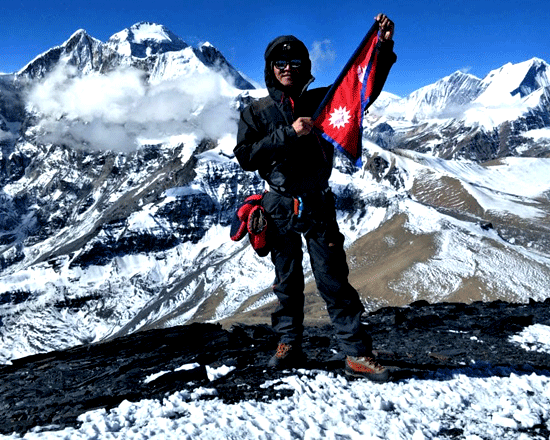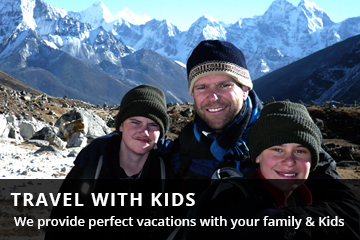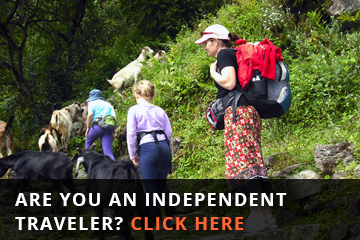Island peak Everest base camp trek
Island peak Everest base camp trek
Peak Climbing In NepalTrip Facts
This is challenging and technical Trekking, climbing of Nepal, you most have to physically fit and mentally prepare, off the beaten trails, camping or challenging high passes Treks, at this level can he arranged for periods of 18 to 32 days. Typically, a gradual ascent through a green river valley will lead you up to a number of high passes, where you will reach the altitude of 5416m. Often times, you will get a close insight into the Tibetan culture. Participants should expect to trek above 5416m/17872ft. or climbing 6540m.
Mode of Travel : Flight/Land100%
Overview
Everest base camp trek with island peak climbing 19 days
The Island Peak Everest Base Camp Trek via the Three Passes is a captivating 19-day adventure that commences and concludes in the lively city of Kathmandu, Nepal. This extraordinary journey leads you through the enchanting Gokyo Lakes region, nestled within the stunning heritage of the Khumbu Valley. The trek to Island Peak and Everest Base Camp is an exhilarating journey that immerses you in the heart of Nepal’s Khumbu region. The trek presents awe-inspiring views of the world’s highest peak, Mount Everest. But it also offers the thrilling opportunity to summit Island Peak—a challenging yet attainable climb for adventure enthusiasts.
Everest base camp trek with island peak climbing
Get ready for a big challenge as you aim to conquer Island Peak climbing via three tough high mountain passes: Renjo La (5,360m), Cho La (5,420m), and Kongma La (5,535m). These passes are famous for their amazing views of Mt. Everest, making this trek known as the Three Passes Trek. Each pass is like a doorway to stunning natural beauty and will test your strength for the mountain adventure journey. Get set to be amazed as you cross these tough passes and see the breathtaking scenery waiting for you in the Himalayas.
Island Peak: A Himalayan Gem
The highlight of the Everest base camp trek with island peak climbing adventure is reaching the summit of Island Peak (6,189m), also called Imja Tse. This impressive peak, situated between the imposing Lhotse/Nuptse South Wall and Baruntse, offers an exciting challenge. While being physically fit is important, scaling Island Peak doesn’t require advanced technical skills. As you secure yourself with a rope and put on crampons to traverse the glacier field, our experienced climbing guides will prioritize your safety every step of the way.
Everest Base Camp: The Ultimate Ascent
Island peak Everest base camp trek kicks off with a gradual descent from Lukla to Phakding, a charming village situated along the Dudh Kosi river. This initial part of the journey offers a glimpse into the picturesque Sherpa villages and lush rhododendron forests that characterize the Khumbu region. As you cross suspension bridges, you’ll feel the excitement building for the days ahead.
The journey continues to Namche Bazaar, a bustling Sherpa town perched on a mountainside. Namche Bazaar is not only a hub for trekkers but also a place to soak in the mesmerizing views of Mount Everest, Lhotse, and Ama Dablam. A rest day here allows for acclimatization, during which you can explore the town’s markets and visit the nearby Everest View Hotel for even more breathtaking vistas.
A Journey Through Legends
- From Chhukung, trekkers hike to Island Peak Base Camp (5,200m), which takes about 3-4 hours.
- The summit push typically starts very early in the morning (around 2 AM) to take advantage of stable weather conditions and to ensure a return to Base Camp by afternoon.
- The climb involves crossing glaciers, climbing a steep snow headwall, and finally, ascending a narrow ridge to the summit.
- The summit of Island Peak is at 6,189m (20,305ft), offering spectacular views of the surrounding peaks, including Lhotse, Nuptse, and Makalu.
- After summiting, climbers descend back to Base Camp and then retrace their steps to Chhukung, Dingboche, Tengboche, Namche Bazaar, and finally Lukla, where they catch a flight back to Kathmandu.
The more interesting part of the journey of peak submitting is following the path of famous mountaineers. Sir Edmund Hillary and Tenzing Norgay, who conquered Everest in 1953, used Island Peak for training. Now, you can walk the same way they did, making your adventure even more special.
Physical Fitness Preparation for Peak Climbing
- Hiking and Trekking: Start with moderate hikes and gradually increase the distance and elevation gain. Carry a backpack to simulate climbing conditions.
- Running and Jogging: Include interval training and long-distance runs to build aerobic capacity and endurance.
- Cycling: Both road biking and mountain biking are excellent for building leg strength and cardiovascular fitness.
- Swimming: Great for overall cardiovascular conditioning and low-impact exercise.
Frequency: Aim for 3-5 times per week, with sessions lasting 30-60 minutes.
Strength Training
- Legs: Squats, lunges, deadlifts, and step-ups to build strength in your quadriceps, hamstrings, calves, and glutes.
- Core: Planks, Russian twists, leg raises, and mountain climbers strengthen your core muscles, which are crucial for stability and balance.
- Upper Body: Pull-ups, push-ups, bench presses, and rows to develop arm, shoulder, and back strength needed for climbing and handling ropes.
Frequency: Aim for 2-3 strength training sessions per week, focusing on different muscle groups.
Mental Training
- Visualization: Practice visualizing successful climbs and overcoming obstacles.
- Meditation: Incorporate mindfulness and meditation techniques to improve mental clarity and stress management.
- Goal Setting: Set realistic, incremental goals to keep motivated and track progress.
A Carefully Crafted Itinerary
Island Peak Everest Base Camp Trek is a meticulously designed 19-day itinerary that incorporates essential acclimatization periods. As you gradually ascend the Khumbu Valley via the Three Passes, you’ll have the opportunity to savor magnificent views from Gokyo Ri (5,357m) and Kala Patthar (5,545m). These vantage points provide unparalleled perspectives on the Himalayan giants that surround you.
Island Peak Climbing: A Challenge Worth Pursuing
Island Peak climbing is considered challenging due to the high altitude, physical endurance required, glacier crossings, and unpredictable weather conditions. While it demands proper training and preparation, our experienced guides ensure your safety and success on this remarkable ascent.
Success Rate and Safety
The likelihood of successfully reaching the summit of Island Peak usually falls between 60% to 70%. Several factors, such as weather conditions, personal experience, and acclimatization, play a role in determining the outcome. Ensuring safety is the top priority, and participating in guided expeditions enhances the chances of a successful climb. Having experienced guides can make a significant difference in navigating challenges and increasing the overall success rate of summit attempts.
Your Experienced Guides
When you join the Nepal Wilderness Trekking team for this extraordinary adventure, you’re in the hands of seasoned experts. Our experienced climbing guides are ready to lead you through the heart of the Himalayas on this exhilarating journey. With years of experience, they possess the necessary expertise to ensure your safety and success on this technical ascent.
An Unforgettable Adventure
Everest base camp trek with island peak climbing offers not only the thrill of scaling Island Peak but also the challenge of conquering three high mountain passes – Renjo La, Cho La, and Kongma La. With excellent acclimatization opportunities, your summit attempt on Island Peak becomes more achievable.
Comprehensive Support
The Nepal Wilderness Trekking team leads the Island Peak Everest Base Camp trek with exceptional services and unwavering support for our valued clients. Our dedicated team of seasoned porters and support staff is committed to ensuring that your trek and climb are not only adventurous but also marked by seamless and unforgettable experiences. With their expertise and passion for the outdoors, our team endeavors to make your journey through the breathtaking landscapes of Nepal an enriching and memorable adventure. Trust us to be your reliable companions on this exhilarating trekking and climbing expedition.
Conclusion: A Journey to Cherish Forever
Join us on the Island Peak Everest Base Camp trek for an unparalleled adventure. You’ll fulfill your dream of summiting a technical 6000-meter peak and create lifelong memories of the Himalayan wilderness. Embrace the spirit of adventure as our expert team guides you to the pinnacle of Island Peak, an achievement to cherish forever.
Island Peak Climbing Permit Costs
Obtaining permits for Island Peak climbing is an essential part of the process. The Nepal Mountaineering Association (NMA) issues permits for various peaks, with Island Peak categorized as a Group B trekking peak. Permit costs vary based on the season:
- Spring (March to May): USD 250 per person
- Autumn (September to November): USD 125 per person
- Winter (December to February): USD 70 per person
- Summer (June to August): USD 70 per person
Spring and Autumn are the preferred seasons for climbing Island Peak due to their favorable weather conditions, with Spring being the peak season, commanding the highest permit cost. Winter and Summer, with fewer tourists, entail lower expenses.
It’s important to note that NMA permits can only be obtained through government-registered local trekking agencies affiliated with the Nepal Mountaineering Association (NMA). These agencies can not only secure your permit but also provide comprehensive support and arrangements for your island peak climbing with EBC Adventure.
Detail Itinerary
- Day 1: Fly to Lukla (Hillary Airport) early in the morning (2,800m, 35 minutes), then trek to Phakding (2,640m, 3 hours). Overnight at a lodge. In the evening, take a brief village tour.
- Day 2: Trek to Namche Bazaar (3,440m, 6-7 hours). Overnight at a lodge.
- Day 3: Rest day in Namche for acclimatization. Visit the Sherpa Museum and Everest View Lodge for panoramic Himalayan views.
- Day 4: Trek to Thame (3,800m, 4 hours). Overnight at a lodge. Thame is renowned among Everest climbers.
- Day 5: Trek to Lungdeng (4,600m, 5-6 hours). Overnight at a lodge.
- Day 6: Trek to Gokyo (4,760m) via Renjo Pass (5,435m, 6 hours). Overnight at a lodge in Gokyo.
- Day 7: Early morning hike to Gokyo Peak (5,560m, 4.5 hours) for sunrise and panoramic views of four 8,000m+ peaks. Return to Gokyo and stay overnight at a lodge.
- Day 8: Trek to Tangnak (5 hours). Overnight at a lodge. (If time allows, you can spend an extra day in Gokyo to visit the 5th Lake for additional mountain views.)
- Day 9: Trek to Zhong La via Cho La Pass (5,320m, 6-7 hours). The path is narrow and steep, leading to the top of Cho La. Overnight at a lodge.
- Day 10: Trek to Lobuche (4,930m, 4 hours). Overnight at a lodge.
- Day 11: Trek to Gorakshep (3 hours). Afterward, visit Everest Base Camp and return to Gorakshep for the night.
- Day 12: Early morning hike to Kala Patthar (5,545m) for the best Everest views. Then trek back to Lobuche (5 hours). Overnight at a lodge.
- Day 13: Cross Kongma-La (5,535m, 7 hours). Overnight at a lodge in Chukung.
- Day 14: Hike to Island Peak Base Camp (5,200m, 3 hours). Your climbing guide will conduct a 2-hour training session on using crampons, belay ropes, safety procedures, and more.
- Day 15: Summit Island Peak (6,189m) and return to Chukung. If the weather is bad or you return late, you will stay at the base camp for the night.
- Day 16: Trek back to Tyangboche (3,860m, 5 hours). Overnight at a lodge.
- Day 17: Trek back to Namche Bazaar (3,440m, 6-7 hours). Overnight at a lodge.
- Day 18: Trek back to Lukla (7-8 hours). Overnight at a lodge.
- Day 19: Fly back to Kathmandu early in the morning around 07:00 AM (35 minutes).
Cost Included
- Round-trip domestic flight tickets: Kathmandu/ Ramechhap-Lukla-Ramechhap, including the guide's ticket.
- Full board meals (breakfast, lunch, and dinner) during the trek.
- Accommodation in tea houses as per the itinerary.
- Everest National Park Entry Permit.
- Trekkers Information Management System (TIMS) card.
- Experienced, English-speaking trekking guide with a government license and training from the Ministry of Tourism.
- Kitchen equipment: trekking tents, dining tents, kitchen tents, toilet tents, tables, chairs, and mattresses during the trek and peak climbing period.
- Climbing equipment: rope, ice screws, snow anchors.
- Staff: 1 cook, 1 kitchen helper, 1 climbing guide, and a base camp assistant.
- Insurance for the Nepalese team members.
- Service charges.
- Equipment fees for the climbing guide.
- Peak climbing permit.
- Meals from base camp to base camp during the climbing period.
- Climbing gear: crampons, harnesses, ice axe, screw gear, carabiners.
- Meals, accommodation, salary, and insurance for the guide and porter.
- All necessary paperwork, government, and local taxes.
Cost Excluded
- Kathmandu hotel accommodation.
- Climbing boots.
- Emergency rescue and evacuation.
- Sleeping bag.
- Personal expenses.
- Tips for staff (tipping is at the traveler’s discretion).
- Services not mentioned in the "Services Included" section (please inquire if uncertain about any service).
- Tips for the guide and porter are not included and are at the traveler’s discretion.
- All costs and expenses not listed under "Cost Includes" are excluded.
- Please note that unforeseen factors, such as landslides, weather conditions, itinerary changes for safety reasons, illness, government policy changes, or strikes, may affect costs or cause delays.
| Trip Dates | Trip Price | Confirmed Pax | Trip Status | |
|---|---|---|---|---|
| March 30, 2025 | US$ 2450 | Join a Group | Book Now | |
| April 4, 2025 | US$ 2450 | Join a Group | Book Now | |
| April 8, 2025 | US$ 2450 | Join a Group | Book Now | |
| April 12, 2025 | US$ 2450 | Join a Group | Book Now | |
| April 16, 2025 | US$ 2450 | Join a Group | Book Now | |
| April 20, 2025 | US$ 2450 | Join a Group | Book Now | |
| April 24, 2025 | US$ 2450 | Join a Group | Book Now | |
| April 28, 2025 | US$ 2450 | Join a Group | Book Now | |
| April 28, 2025 | US$ 2450 | Join a Group | Book Now | |
| April 30, 2025 | US$ 2450 | Join a Group | Book Now | |
| May 4, 2025 | US$ 2450 | Join a Group | Book Now | |
| May 9, 2025 | US$ 2450 | Join a Group | Book Now | |
| May 12, 2025 | US$ 2450 | Join a Group | Book Now | |
| May 16, 2025 | US$ 2450 | Join a Group | Book Now | |
| May 20, 2025 | US$ 2450 | Join a Group | Book Now | |
| May 25, 2025 | US$ 2450 | Join a Group | Book Now | |
| May 30, 2025 | US$ 2450 | Join a Group | Book Now | |
| June 4, 2025 | US$ 2450 | Join a Group | Book Now | |
| June 9, 2025 | US$ 2450 | Join a Group | Book Now | |
| June 14, 2025 | US$ 2450 | Join a Group | Book Now | |
| June 19, 2025 | US$ 2450 | Join a Group | Book Now | |
| June 20, 2025 | US$ 2450 | Join a Group | Book Now | |
| June 26, 2025 | US$ 2450 | Join a Group | Book Now | |
| June 30, 2025 | US$ 2450 | Join a Group | Book Now | |
| July 4, 2025 | US$ 2450 | Join a Group | Book Now | |
| July 10, 2025 | US$ 2450 | Join a Group | Book Now | |
| July 15, 2025 | US$ 2450 | Join a Group | Book Now | |
| July 20, 2025 | US$ 2450 | Join a Group | Book Now | |
| July 25, 2025 | US$ 2450 | Join a Group | Book Now | |
| July 30, 2025 | US$ 2450 | Join a Group | Book Now | |
| August 4, 2025 | US$ 2450 | Join a Group | Book Now | |
| August 10, 2025 | US$ 2450 | Join a Group | Book Now | |
| August 15, 2025 | US$ 2450 | Join a Group | Book Now | |
| August 20, 2025 | US$ 2450 | Join a Group | Book Now | |
| August 25, 2025 | US$ 2450 | Join a Group | Book Now | |
| August 30, 2025 | US$ 2450 | Join a Group | Book Now | |
| September 4, 2025 | US$ 2450 | Join a Group | Book Now | |
| September 10, 2025 | US$ 2450 | Join a Group | Book Now | |
| September 15, 2025 | US$ 2450 | Join a Group | Book Now | |
| September 20, 2025 | US$ 2450 | Join a Group | Book Now | |
| September 25, 2025 | US$ 2450 | Join a Group | Book Now | |
| September 30, 2025 | US$ 2450 | Join a Group | Book Now | |
| October 3, 2025 | US$ 2450 | Join a Group | Book Now | |
| October 10, 2025 | US$ 2450 | Join a Group | Book Now | |
| October 19, 2025 | US$ 2450 | Join a Group | Book Now | |
| October 22, 2025 | US$ 2450 | Join a Group | Book Now | |
| October 26, 2025 | US$ 2450 | Join a Group | Book Now | |
| October 30, 2025 | US$ 2450 | Join a Group | Book Now | |
| November 6, 2025 | US$ 2450 | Join a Group | Book Now | |
| November 12, 2025 | US$ 2450 | Join a Group | Book Now | |
| November 17, 2025 | US$ 2450 | Join a Group | Book Now | |
| November 22, 2025 | US$ 2450 | Join a Group | Book Now | |
| November 27, 2025 | US$ 2450 | Join a Group | Book Now | |
| November 30, 2025 | US$ 2450 | Join a Group | Book Now | |
| December 5, 2025 | US$ 2450 | Join a Group | Book Now | |
| December 10, 2025 | US$ 2450 | Join a Group | Book Now | |
| December 16, 2025 | US$ 2450 | Join a Group | Book Now | |
| December 22, 2025 | US$ 2450 | Join a Group | Book Now | |
| December 26, 2025 | US$ 2450 | Join a Group | Book Now | |
| December 30, 2025 | US$ 2450 | Join a Group | Book Now |

